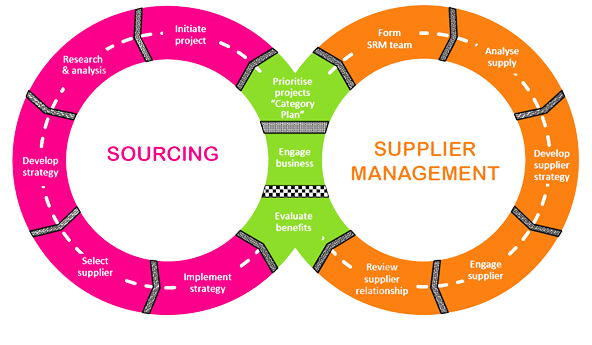Elevate Your Supply Chain Precision In Sourcing Excellence In Strategy
Sourcing refers to the process of finding and obtaining goods or services from suppliers for use in manufacturing or resale. It can include identifying suppliers, negotiating contracts, and managing supplier relationships. Effective sourcing can help a company reduce costs, improve quality, and ensure a steady supply of materials. There are various approaches to sourcing, including inbound sourcing (i.e. working with suppliers to produce goods or services), outbound sourcing (i.e. outsourcing work to external providers), and global sourcing (i.e. sourcing goods and services from suppliers in different countries).
There are several types of sourcing, including:
Inbound Sourcing: A company works with suppliers to produce goods or services that are needed for its operations.
Outbound Sourcing: A company outsources work to external providers to take advantage of their expertise, lower costs or increase efficiency.
Global Sourcing: A company sources goods and services from suppliers in different countries to take advantage of lower costs, better quality or to access new markets.
Direct Sourcing: A company sources goods directly from manufacturers rather than through intermediaries.
Indirect Sourcing: A company sources goods and services through intermediaries, such as distributors or wholesalers.
Strategic Sourcing: A systematic approach to sourcing that considers the entire supply chain and seeks to optimize costs, quality, and risk management.
Reverse Sourcing: A company sources goods from suppliers based on returned or excess inventory.

Types of Sourcing
1. Inbound Sourcing
2. Outbound Sourcing
3. Global Sourcing
4. Direct Sourcing
5. Indirect Sourcing
6. Strategic Sourcing
7. Reverse Sourcing
Key Points in Global Sourcing
Global sourcing also comes with its own set of challenges, including differences in regulations, language barriers, and logistics, which must be effectively managed to ensure a successful global sourcing strategy. However, we have summarized the key points to consider in Global Sourcing as below, but not limited to:
Conduct Thorough Research: Before entering into a global sourcing agreement, it is important to research the market, the suppliers and the cultural differences that may impact the relationship.
Establish Clear Communication: Good communication is key to a successful global sourcing relationship. Establish clear lines of communication and agree on the frequency of updates.
Evaluate Suppliers Carefully: When evaluating suppliers, consider factors such as quality, delivery time, and cost. It is also important to understand the supplier’s capacity, capabilities, and reputation.
Negotiate Contracts: Be sure to negotiate a clear and detailed contract that covers the scope of work, delivery schedule, quality standards, and payment terms.
Manage Logistics: Managing logistics, including transportation, customs, and import/export regulations, can be complex in global sourcing. It is important to have a well-planned and organized logistics strategy.
Monitor and Manage Risks: There are several risks associated with global sourcing, including currency fluctuations, political instability, and shipping delays. Be sure to monitor these risks and put contingency plans in place to manage them.
Foster Long-Term Relationships: Building strong and long-lasting relationships with suppliers is essential for a successful global sourcing strategy. Foster these relationships by paying on time, providing feedback, and being a reliable partner.
Compliance: Ensure that the supplier is compliant with all relevant laws and regulations, including labor and environmental standards, to avoid any legal or reputational risks.
Continuous Improvement: Regularly review the global sourcing process and make improvements to ensure continued success. This can include regular supplier performance evaluations, cost negotiations, and process improvements.
Cultural Awareness: Respect for cultural differences is key.
What Makes us Unique in Sourcing!
Global sourcing also comes with its own set of challenges, including differences in regulations, language barriers, and logistics, which must be effectively managed to ensure a successful global sourcing strategy. However, we have summarized the key points to consider in Global Sourcing as below, but not limited to:
Tailored to Your Company’s Needs: The sourcing process can be designed and tailored to meet the specific needs and requirements of your company.
Innovative Approaches: We implement innovative approaches to sourcing, such as using technology to streamline the process or developing new sourcing strategies to increase efficiency.
Integration with Your Company’s Overall Strategy: The sourcing process can be integrated with your company’s overall business strategy to ensure alignment and maximum effectiveness.
Emphasis on Sustainability and Ethical Practices: We prioritize sustainability and ethical practices, such as sourcing from suppliers who have environmentally friendly processes and fair labor & business practices.
Focus on Continuous Improvement: We have a continuous improvement focus, regularly reviewing and updating the process to ensure that it stays up-to-date and meets changing needs and requirements.
Our ultimate goal to increase customer’s satisfaction and loyalty, and to help them differentiate their product or service from competitors.


